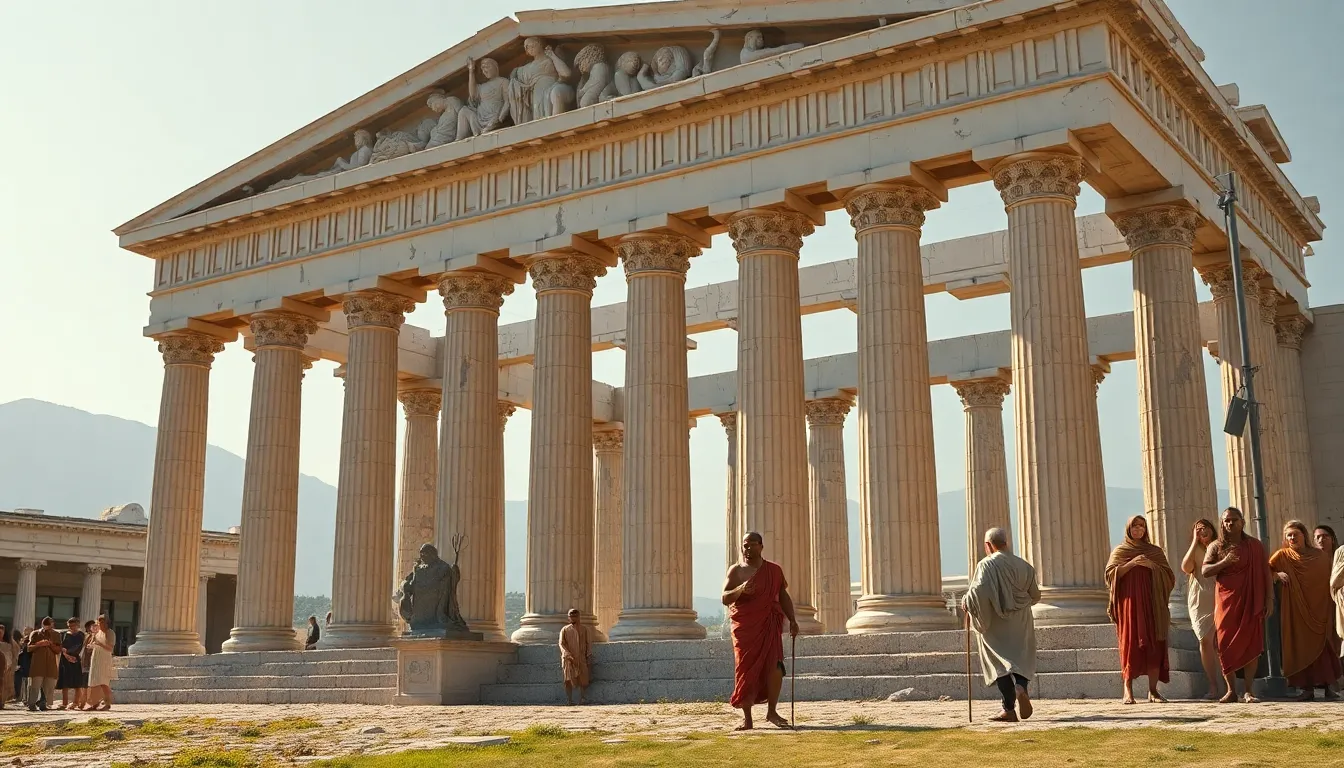How Ancient Greek Festivals Brought People Together: A Sociological Perspective
I. Introduction
Ancient Greek festivals were vibrant celebrations that played a crucial role in the social fabric of Greek society. These events were not merely occasions for entertainment; they were essential in fostering social cohesion and community identity. In a world where social ties were paramount, festivals served as a unifying force, bringing together people from diverse backgrounds and reinforcing the bonds that held society together. This article explores the sociological implications of these festivals, examining how they contributed to community building and social dynamics in ancient Greece.
II. Historical Context of Ancient Greek Festivals
Several key festivals marked the ancient Greek calendar, each with unique significance and cultural importance. Below are some of the most notable:
- Olympian Festivals: The Olympic Games, held every four years, celebrated athletic prowess and honored Zeus. Competitions drew athletes from various city-states, fostering a spirit of both rivalry and camaraderie.
- Dionysian Festivals: These festivals, dedicated to Dionysus, the god of wine and revelry, included dramatic performances and communal feasting, emphasizing the importance of theater and arts in Greek culture.
- Panathenaic Festival: Celebrated in Athens, this festival honored Athena, the city’s patron goddess. It featured athletic competitions, musical contests, and a grand procession, reinforcing civic pride and unity.
Religion and mythology played a central role in these festivals, intertwining the divine with daily life. Festivals were not only a means of worship but also a way to express cultural values, stories, and communal beliefs, reflecting the rich tapestry of Greek culture.
III. Social Functions of Festivals
Ancient Greek festivals served multiple social functions that were vital to the cohesion of communities:
- Building Community Identity and Solidarity: Festivals were occasions for communities to come together, fostering a sense of belonging and shared identity. Participants often felt a connection to their fellow citizens as they celebrated common traditions and values.
- Opportunities for Social Interaction and Networking: These events provided a platform for individuals to connect, form alliances, and strengthen existing relationships. The mingling of different factions during festivals allowed for the exchange of ideas and cultural practices.
- Role in Reinforcing Social Hierarchies and Roles: While festivals promoted unity, they also reflected and reinforced existing social structures. For instance, certain rituals and competitions were often reserved for the elite, thus affirming social stratification.
IV. Economic Impacts of Festivals
The economic implications of ancient Greek festivals were significant, influencing trade and local economies:
- Trade and Commerce During Festival Times: Festivals attracted visitors from across the region, leading to increased trade activities. Merchants capitalized on the influx of attendees, selling goods ranging from food and drink to crafts and religious artifacts.
- Economic Benefits for Local Communities: Local economies thrived during festivals, as businesses catered to the needs of visitors. This influx of commerce could provide a substantial boost to local prosperity.
- Sponsorship and Patronage Dynamics: Wealthy citizens often sponsored events, seeking social prestige and civic responsibility. This patronage system highlighted the interconnectedness of social status and economic power.
V. Political Dimensions of Festivals
Festivals in ancient Greece held significant political dimensions, acting as a stage for civic expression and participation:
- Festivals as a Platform for Political Expression: Many festivals included speeches and contests that allowed citizens to voice their opinions and engage in political discourse, fostering a culture of civic engagement.
- The Role of Civic Participation and Citizenship: Participation in festivals was often linked to citizenship, reinforcing the importance of civic duty and collective responsibility among citizens.
- Festivals and the Reinforcement of Democracy: By encouraging public participation and discussion, festivals played a role in shaping democratic practices, highlighting the power of collective action in society.
VI. Psychological and Emotional Benefits
The psychological and emotional benefits of participating in festivals were profound:
- Collective Joy and Catharsis: Festivals provided a space for collective celebration, allowing individuals to experience joy and release pent-up emotions in a supportive environment.
- Rituals as a Means of Coping with Life’s Challenges: The structured nature of festivals and rituals offered a sense of stability and continuity, helping communities cope with the uncertainties of life.
- The Role of Festivals in Mental Well-Being: Engaging in communal festivities fostered a sense of belonging and improved mental health, reinforcing the idea that social interactions are vital for psychological well-being.
VII. Legacy and Influence of Ancient Greek Festivals
The legacy of ancient Greek festivals has had a lasting impact on subsequent cultures and modern societies:
- Impact on Later Cultures and Societies: Many cultural practices and festival traditions have roots in ancient Greek customs, influencing the development of festivals across Europe and beyond.
- Modern Parallels in Contemporary Festivals: Today’s festivals often echo the themes of community, celebration, and social interaction found in ancient Greek traditions, demonstrating the enduring significance of these practices.
- Lessons from Ancient Practices for Today’s Society: The communal spirit and social functions of festivals offer valuable insights into fostering social cohesion and community engagement in contemporary life.
VIII. Conclusion
In summary, ancient Greek festivals were multi-faceted events that played a vital role in shaping social dynamics, economic activity, and political expression in their time. They were not only celebrations of culture and religion but also essential for the psychological and emotional well-being of individuals and communities. Understanding the sociological implications of these festivals highlights their relevance in modern studies, encouraging us to appreciate the historical practices that foster community and connection. As we navigate today’s complex social landscape, the lessons drawn from ancient Greek festivals can inspire us to cultivate unity and shared identity in our own societies.




